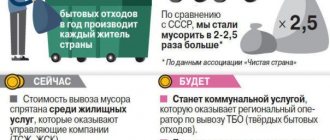From this article you will learn:
- About the solid waste removal service at the legislative level
- Step-by-step instructions for purchasing solid waste removal services
- What is the removal of solid waste according to 44-FZ from a single supplier?
- Procedure for notifying purchases in the UIS
- Pricing procedure
- Latest changes in legislation on solid waste removal under 44-FZ
The removal of solid waste according to 44-FZ is strictly regulated, in a certain sense intersecting with environmental legislation and compliance with sanitary standards. According to them, organizations and institutions are obliged to monitor the timely removal of waste from places where it accumulates.
And although today the purchase of solid waste removal services takes place according to a simplified option - from a single supplier - this procedure has its own nuances. The customer needs to take into account everything: the grounds for the purchase, the features of its planning, pricing conditions, not to mention the rules for drawing up a contract with the regional operator.
Solid waste removal service at the legislative level
Garbage removal is one of the services that is used most frequently. To a beginner, the subject of such a purchase may seem simple, but it is not so. The fact is that the removal of solid waste under 44-FZ has many nuances. Let's start with the fact that in the procurement process the household concept of “garbage” is usually replaced by MSW, that is, “domestic solid waste”, or MSW – “municipal solid waste”.
Law 44-FZ allows companies, legal entities, and individual entrepreneurs that have the appropriate license to carry out solid waste removal activities. The contractor must fulfill the obligations specified in the contract for the provision of services. You need to understand that the features of waste transportation directly depend on their category.
The services we are interested in are purchased by residents of apartment buildings. In this case, the owner of the house is responsible for the condition of the site and waste collection containers. In addition, legal entities and individual entrepreneurs can receive similar GWS.
Article 426 of the Civil Code of the Russian Federation establishes: all entities that have such a need have the right to sign a document according to which solid waste will be removed in accordance with 44-FZ. The corresponding contract must be concluded with the regional operator; to select the latter, the tariff commission holds a competition. A single regional representative has every opportunity to fulfill the terms of the agreement, since he has well-organized logistics and is responsible for all processes. The latter refers to the collection, transportation to the destination and recycling of waste.
Step-by-step instructions for purchasing solid waste removal services
To select a contractor for the terms of the contract for the removal of solid waste under 44-FZ, competitive methods can be used or an agreement can be concluded with a single supplier in 2021. When conducting competitive bidding, customers are recommended to use the following sequence of actions:
- Description of the subject of the tender.
To do this, it is important for the buyer to accurately understand what type of waste should be removed from his territory. In other words, he needs to understand the difference between household solid waste (MSW) and municipal solid waste (MSW):
- Solid waste is household waste generated every day. This category is usually divided into biological waste, or remains of food and plants, and non-biological, namely plastic, textiles, glass, cellulose.
- MSW is garbage that accumulates in residential and non-residential premises; this also includes goods that no longer meet consumer requirements. This category also includes waste generated during the economic activities of legal entities.
The concept of MSW is established by law 89-FZ. This legislative act also defines such public services as waste removal and disposal. According to current regulations, any collected waste can be designated exclusively as “solid municipal waste.”
- Preparation of technical specifications for the performer.
The main task of the customer during the preparation of technical specifications is to correctly establish the hazard class of the exported waste. At the moment, the law fixes the following classes for MSW:
- Extremely hazardous, characterized by a critical level of hazard, namely waste containing mercury, mineral oils, terphenyls.
- Highly hazardous: batteries, lead waste, oil.
- Moderately hazardous: diesel fuel, cement dust, acetone.
- Low-hazard, characterized by a low degree of danger, that is, construction waste, solid waste, asphalt waste.
- Non-hazardous, from which the level of threat to the environment is very low: wood, ceramic objects, food waste.
- Registration of application requirements.
Let us remind you that the removal of solid waste under 44-FZ can only be carried out by contractors with the appropriate license. The activities of organizations involved in the collection, transportation, processing and disposal of waste belonging to the first four hazard classes must be licensed. Thus, only specialized companies can remove and dispose of waste.
- Registration of a government contract.
The text of the contract specifies not only services for the removal of solid waste in accordance with 44-FZ, but also for reception, transportation, processing, neutralization, and burial. The draft document must include significant conditions related to the composition, storage method, weight, place of reception, principles of commercial accounting of the volume of MSW.
The annexes to the agreement must include:
- volume, place of storage and accumulation of waste;
- information in graphical form about the location of MSW collection and accumulation sites, as well as access roads.
The responsibilities of the regional operator include providing the customer with documents indicating waste disposal.
The document signed by the customer and the contractor may be referred to as a “contract” or “agreement”. In this case, the specific name is unimportant; the main thing is that the agreement be drawn up in writing. The contract for the provision of waste management services is public for the regional operator. This means that the latter does not have the right to refuse to conclude such a contract, provided that the waste accumulation sites are located in the area for which he is responsible.
.
Imposing unfavorable conditions for commercial accounting of MSW on consumers
Another controversial and controversial issue is the procedure for commercial accounting of the volume and mass of MSW. In accordance with clause 15 of the standard agreement, the parties are required to choose a method for commercial accounting of waste in accordance with Rules No. 505.
According to paragraph. 5 of Rules No. 505, clause 148(30) of Rules No. 354, for consumers in residential premises, MSW accounting is carried out based on waste accumulation standards. If separate accumulation of sorted MSW is introduced - based on the number and volume of containers. When separating waste collection, calculations “after the fact” are mandatory for recyclers.
If the reoperator imposes other, unfavorable conditions for commercial accounting of MSW on consumers, then such actions contain signs of violation of antimonopoly legislation (Clause 3, Part 1, Article 10 No. 135-FZ).
How to prohibit third parties from placing a garbage container in the courtyard of an apartment building
Removal of solid waste according to 44-FZ from a single supplier
At the moment, customers are allowed to purchase solid waste removal services under 44-FZ from one contractor. The object of the agreement may be:
- water, heat, gas supply and sanitation services;
- MSW management;
- connection to engineering and technical networks;
- storage, import of narcotic drugs, psychotropic substances.
The concept of “waste management” includes collection, removal, accumulation, processing, disposal, neutralization, and disposal. All listed services may be the subject of a contract with a single contractor.
What if you don’t register as a legal entity?
If you have created a legal entity to work from home, then most likely you need it in order to officially work with clients who cannot “throw it on the card”, and the option of registering as a self-employed citizen is not suitable for you, so there are no other options you are not there. A person, of course, can try to work “in the shadows” for some time, but the CEB reminds that in these cases, entrepreneurs who have not entered into an agreement with a re-operator, but conduct business activities without forming a legal entity, can be fined in the amount of 30 to 50 thousand rubles under Article 8.2 of the Code of Administrative Offenses of the Russian Federation on “non-compliance with requirements in the field of environmental protection when handling production and consumption waste.” This article does not regulate the relationship of the reoperator with legal entities, but it establishes how individuals and legal entities should handle waste. Although if an entrepreneur does not produce any waste, then it turns out that there is nothing to fine him for.
This publication was made possible thanks to the support of our readers. If you are ready to support our work, you can donate any amount or, even better, sign up for a regular subscription here. Everyone who signs up for a monthly subscription in the amount of 500 rubles or more will receive a personal thank you from us on the website. We will also invite him to be added to a closed chat along with journalists from our publication. Remember: independence cannot be bought, but it can be helped. Thank you for being with us! Together with you we are stronger!
Procedure for notifying purchases in the UIS
Before signing the contract, the institution places a notice of the planned purchase in the Unified Information System. The document must be published at least five days before the conclusion of the contract.
The notice states:
- name of location, postal address, contact number and email, responsible officer of the customer;
- brief terms of the contract, including the name and description of the subject of the auction;
- size, requirements for security for the execution of a contract and the procedure for its provision (if security must be used under Article 96 of Law 44-FZ).
When generating planning documents and tender notices in the Unified Information System, the customer must enter the code from OKPD2. Depending on the specifics of the buyer’s activity, the following codes are used:
- 11.29.000 – “Services for the collection of other non-hazardous waste that is not suitable for reuse”;
- 11.21.000 – “Services for the collection of non-hazardous municipal waste that is not suitable for reuse.”
Failure to comply with SanPin requirements for the frequency of waste removal from places where it accumulates
FAS Russia, in a letter dated August 11, 2021 No. VK/67016/21, dwelled in detail on the question of whether the reclaimer must comply with sanitary standards and rules regarding the timing and frequency of removal of MSW from container sites.
According to clause 3 of Rules No. 1156, regional operators work taking into account the environmental legislation of the Russian Federation and regulations in the field of ensuring the sanitary and epidemiological well-being of the population. This activity must be safe for the public and the environment.
Laws in the field of MSW management establish imperative requirements for the recycler in terms of compliance with sanitary and epidemiological standards, including the issue of the frequency of waste removal from sites. Thus, it must comply with the time limits for the temporary accumulation of unsorted waste established by sanitary rules and regulations.
This position is supported by judicial practice:
- appeal ruling of the Supreme Court of the Russian Federation dated June 19, 2019 No. 1-APA19-5;
- resolution of the Arbitration Court of the North-Western District dated December 24, 2020 in case No. A21-8180/2019;
- Resolution of the Volga District Arbitration Court dated December 17, 2019 in case No. A65-7546/2019;
- Resolution of the Administrative Court of the North Caucasus District dated September 21, 2020 in case No. A63-10417/2019.
Pricing procedure
Tariffs for the removal of solid waste according to 44-FZ are established by the executive authority of the constituent entity of the Russian Federation in the field of state regulation of tariffs. Or this function can be performed by a local government body that regulates tariffs, if the powers were transferred by law of a constituent entity of the Russian Federation. The unified tariff for the service of a regional operator for the management of municipal solid waste cannot be higher than the cost of services for organizing this activity, which was determined based on the results of the competitive selection of regional operators.
The FAS RF has drawn up methodological recommendations, according to which, when calculating tariffs, the required gross revenue for a specific regulated type of activity, as well as the volume and weight of MSW, are taken into account. In all calculation formulas related to the mass of waste, it is customary to carry out calculations in tons or cubes, that is, in cubic meters. This means that the unified tariff of a regional operator in this area should also use such parameters.
When signing an agreement with a regional operator for the provision of services for the removal and management of solid waste in accordance with 44-FZ, the text of the document must refer to the normative act establishing tariffs for this area. For example, this can be done in the “Contract price and payment procedure” section.
Construction waste removal
The contract for the removal of construction waste for individual entrepreneurs in the year is a separate topic. By law, the builder himself is obliged to remove such waste, and not another organization engaged in waste removal.
Since entrepreneurs often contract for various construction and repair work, the following must be taken into account:
- all waste construction materials purchased in the store are removed by the contractor;
- if he cannot do this, then he enters into an agreement with an organization that deals with the disposal of building materials.
When drawing up a contract, it is important to note that this is construction waste. Burying such garbage under the guise of ordinary garbage is punishable by a fine.
On video: Waste recycling in Switzerland









